
Oliver Kazunga, Senior Business Reporter
ZESA Holdings has increased electricity tariffs for consumers by 19,02 percent effective next month, citing the upward movement in exchange rates and inflationary pressures at macro-economic level.
In a notice yesterday, Zesa through its subsidiary, the Zimbabwe Electricity Transmission and Distribution Company (ZETDC), said the new tariffs regime, which comes into effect on March 1, was in tandem with the tariff award of October last year.
“The ZETDC has adjusted the electricity tariffs by 19,02 percent. This is in accordance with the Tariff Award of 2 October 2019, which approved implementation of a monthly tariff indexation formula that takes into account the movement of macro-economic fundamentals such as exchange rate and inflation, for changes above 10 percent,” said ZETDC.
Last October, the Zimbabwe Energy Regulatory Authority (Zera) approved a 320 percent electricity tariff increase to 162,16 cents per kilowatt hour (kWh) pointing out that this was meant to help Zesa improve power supply.
In separate interviews yesterday, representatives of business organisations and consumers lamented the latest electricity tariff hike saying the development poses a serious threat to the operations of companies as well as burdening consumers.
The Confederation of Zimbabwe Industries (CZI) national vice president, Mr Joseph Gunda, said any significant increase in power tariffs renders the local manufacturing sector uncompetitive.
“An increase of 19 percent is quite significant. Any increase in electricity tariffs like this particular one has a negative bearing on operations of industry,” he said.
Mr Gunda said in light of the latest electricity charges, the question industry will be asking is will power be available.
“That increase will actually worsen the situation if power is not made available. As manufacturing companies, we have not been privileged and allowed to price according to the exchange rate that is prevailing.
“We know there is the interbank market foreign exchange rate which we are abiding by but you find some prices of our commodities are beyond the interbank rate.
“So, it still comes to the same thing because a 19 percent increase is quite high and it has a negative bearing on costs of production and will make us uncompetitive.”
Prior to the approval and implementation of the power tariffs, he said, industry has always called on Zesa and responsible authorities to engage them so that common ground can be found.
The Association for Business in Zimbabwe chief executive officer, Mr Victor Nyoni, said the increase in power tariffs was bad news for business as electricity was fundamental in enterprises’ operations.
“Obviously, any increase in electricity charges will echo through every product that we produce. Our thinking is that the issue of electricity tariff increases is as bad as its unavailability because half the time we have power cuts and you compound it with the increase in tariffs.
“Clearly, this will have an inflationary impact on our operations,” he said.
Secondly, Mr Nyoni said, the fact that the new power tariffs were based on indexation is a reflection that the domestic currency was depreciating in value against the major currencies, adding that this was a cause for concern.
“Our currency is losing value and they (Zesa) are reacting to macro fundamentals as they have put it. What it means is that this is a mirror of that our economy at macro-level is not doing so well and this is a cause for concern for our business environment, not just for us who are already in the operations.
“So we think that authorities need to quickly come into this and embrace what could be the permanent solution to our challenges,” he said.
The Consumer Rights Association spokesperson, Mr Effie Ncube, echoed similar sentiments adding that Government needs to intervene as the decision Zesa has taken on power tariffs was wrong.
“While we aren’t advocating for Zesa to run at a loss, we are not advocating for Zesa to profiteer, the power utility has to take into account the economic condition of consumers and the fact that the country is trying to arrest run-away inflation to attract investment.
“Countries that have hyperinflationary environments do not attract investors so there is a co-relationship between stability when it comes to inflation and the amount of investment that we attract into the country.
“Therefore, we are saying it is wrong for Zesa to raise the price of electricity especially at this time when consumers are at their worst in terms of prices,” he said. – @okazunga.
